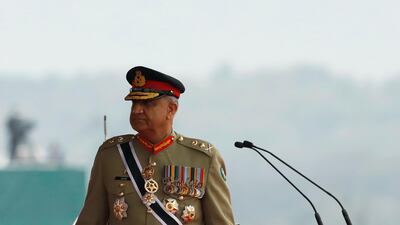Pakistan's military chief will head to Saudi Arabia on Sunday to try to smooth relations with the kingdom after its foreign minister criticised the Gulf country for not supporting its stance on Kashmir.
Gen Qamar Javed Bajwa is due in Riyadh for damage-control talks with one of Pakistan's biggest benefactors amid reports Saudi Arabia has demanded repayment of loans following the remarks.
Ties were strained earlier this month when Pakistan's foreign minister Shah Mahmood Qureshi used a television interview to chide Saudi Arabia for failing to condemn New Delhi's actions in Indian-administered Kashmir.
His comments reportedly angered an ally that is the largest source of remittances to Pakistan and one of its biggest financial backers.
Riyadh is reportedly demanding Pakistan’s early repayment of a $3 billion (Dh11bn) loan and has frozen a $3.2bn oil credit facility.
Pakistan's military maintains the trip by Gen Bajwa, the chief of army staff and arguably the most powerful man in the country, is only for military discussions. But analysts said his visit underlined the importance of healing ties.
“I think there's going to be a lot of grovelling going on in Riyadh,” said Farzana Shaikh, a Pakistan expert at the Chatham House think tank.
“There is great worry, both on the security and the economic level, that this government has simply gone ahead and spoken and acted in a manner judged to be rash,” she said.
The spectre of any withdrawal of Saudi financial support puts intense pressure on Prime Minister Imran Khan's government which was buffeted by a dire financial crisis even before the arrival of the Covid-19 pandemic. A rift is also likely to push Islamabad closer to its other big benefactor, China.
The flare-up has been prompted by Pakistani frustration that the Muslim world has done too little in response to Delhi's withdrawal of self rule in Indian-administered Kashmir. Pakistan has long pressed the Saudi-led Organisation of Islamic Co-operation (OIC) to convene a summit highlighting alleged Indian abuses.
“If you cannot convene it, then I’ll be compelled to ask Prime Minister Imran Khan to call a meeting of the Islamic countries that are ready to stand with us on the issue of Kashmir and support the oppressed Kashmiris,” Mr Qureshi told local media earlier this month.
The apparent challenge has seemingly angered those in the kingdom.
“Pakistani elites have a bad habit of taking Saudi support for granted given what Saudi has done for Pakistan over the decades,” said Ali Shihabi, a Saudi commentator considered close to the government. “Well, the party is over and Pakistan needs to deliver value to this relationship,” he tweeted on Thursday.
Kashmir has been the trigger for two wars between India and Pakistan since 1947 and several other clashes. Islamabad's claim to the whole of the disputed territory is the cornerstone of its foreign and security policy and the world's muted response to India's revocation of Kashmir's special status has frustrated Pakistan.

